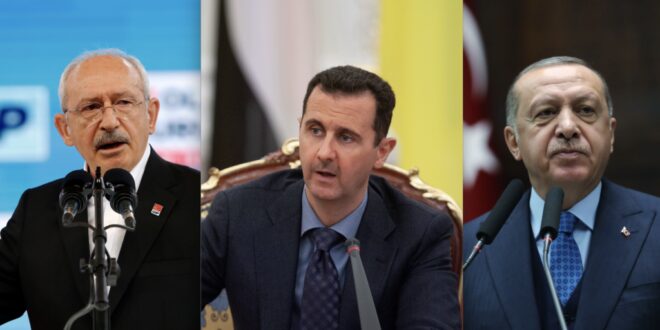Bad blood continues to boil between Assad and Erdogan, with the latter not as eager as other Muslim states to pursue a detente.
Polls indicate that the Turkish presidential race is extremely close with challenger Kemal Kilicdaroglu enjoying a slight lead over Recep Tayyip Erdogan. The outcome of the vote on May 14 will carry major ramifications for the future of Ankara’s foreign policy, particularly Turkey’s relations with Syria.
In terms of the situation in Syria and the plight of millions of Syrian refugees in Turkey, this election will indeed matter. The Syrian refugee question is a sensitive domestic and foreign policy issue among Turks. Kilicdaroglu has proposed a plan that entails normalizing Ankara’s diplomatic relationship with President Bashar al-Assad’s government, signing a protocol with Damascus to ensure the safety of returned Syrian refugees, and having Turkish companies rebuild Syria with UN and EU funds.
Whether realistic or not, such a proposal from Kilicdaroglu is no surprise. The CHP always opposed the government’s efforts to back forces fighting to overthrow Assad.
As an Alevi Muslim, Kilicdaroglu hails from Turkey’s largest religious minority group, which for many years has had problems with Erdogan’s Justice and Development Party (AKP). The Syrian crisis has been an issue fueling friction between many Alevis in Turkey and the AKP.
Thirteen months after the Syrian conflict erupted, Selahattin Ozel, the chairman of the federation of Alevi associations in Turkey, said, “As Turkish Alevis, we do not support an anti-democratic, an anti-humanist regime [in Syria], but we cannot understand why [Erdogan] so suddenly became an enemy of the Syrian administration.” For many years members of the CHP have advocated a Turkish-Syrian renormalization of relations while condemning Ankara’s support for various anti-Assad forces in Syria.
Nonetheless, Erdogan has dealt with the reality of Assad’s survival in pragmatic ways. Under his leadership, Turkey-Syria relations have been thawing in recent years, underscored by the meeting of high-ranking Turkish, Syrian, and Russian ministers in Moscow in December 2022 and subsequent engagement between Ankara and Damascus this year.
Yet, if Kilicdaroglu wins the election this month, experts believe that reconciliation between Turkey and Syria’s governments would move faster.
“Although President Erdogan and…Kilicdaroglu both want to normalize relations with Damascus, it is more likely under the latter’s leadership,” said Steven Cook, the Eni Enrico Mattei senior fellow for Middle East and Africa studies at the Council on Foreign Relations, in an interview with Responsible Statecraft. “The [CHP]…was always opposed to Erdogan’s regime change policy in Syria. As a result, whatever change is in the offering for Turkey’s Syria policy, it is likely going to be easier under Kilicdaroglu.”
Turkey normalizing relations with Syria would constitute a major win for the Damascus government. Assad’s regime would much prefer dealing with a Turkey led by the CHP than the AKP, especially considering that Kilicdaroglu is much more amenable to Damascus’s demands that Ankara withdraw its troops from Syria than Erdogan. “I expect normalization to proceed relatively quickly, especially if Kilicdaroglu commits to a Turkish withdrawal,” explained Cook. “I would not be surprised if Damascus is among the first capitals Kilicdaroglu visits should he become president.”
For now, officials in Damascus are sitting tight as Turkey’s presidential election is five days away. Given how close the race is, Syria’s leadership must prepare for either an Erdogan or Kilicdaroglu win.
“Assad would like Erdogan to lose but must be polite should he prevail,” said Dr. Joshua Landis, director of the Center for Middle East Studies at the University of Oklahoma, in an interview with Responsible Statecraft. “Assad and Erdogan do not like each other. Turkey occupies ten percent of Syria and was the leading backer of militias seeking Assad’s overthrow.”
Nonetheless, even if Erdogan triumphs this month, Ankara and Damascus’s movement toward reopening formal diplomatic relations will probably continue. So will the Assad government’s reintegration into the Arab world’s diplomatic fold with the United Arab Emirates (UAE) being a main driver of these efforts. Such efforts achieved a major breakthrough with Syria’s return to the Arab League on May 7. The outcome of this upcoming Turkish election will not reverse this trend.
“Syria seems to be on the fast track to having normalized relations thanks to help from Abu Dhabi. Damascus is in a better position than just a few years ago, even if Erdogan wins reelection,” explained Colin P. Clarke, the director of policy and research at the Soufan Group, in an interview with Responsible Statecraft.
But a key question is, how much has Erdogan’s diplomatic engagement with Assad’s regime been about the Turkish president’s genuine desire for normalization with Damascus or bolstering domestic support ahead of a difficult election?
Thus, if Erdogan stays at the helm, it is difficult to predict how fast Turkey would move in its negotiations with Syria’s government. “Needless to say, Erdogan’s honeyed words about reconciliation with Syria are designed for the elections. Should Erdogan win [this month], negotiations will begin in earnest,” Landis said.
“Erdogan’s position on normalization and sending Syrians back to Syria are opposition positions that are popular, which is why Erdogan adopted them,” explained Cook. “It is unclear whether he will pursue normalization with particular vigor, especially since he has demonstrated little interest in meeting Assad’s demand that Ankara withdraw its troops from Syrian territory.”
 Eurasia Press & News
Eurasia Press & News



